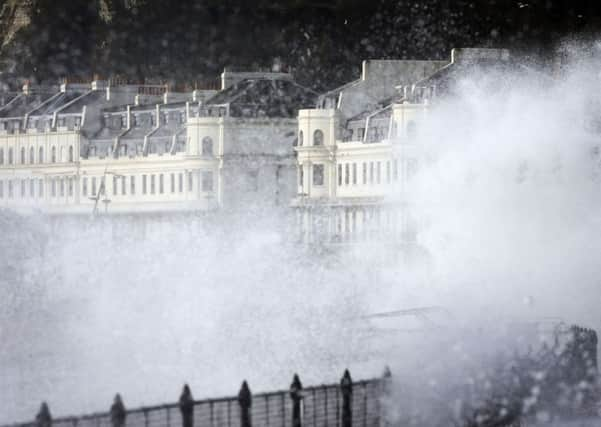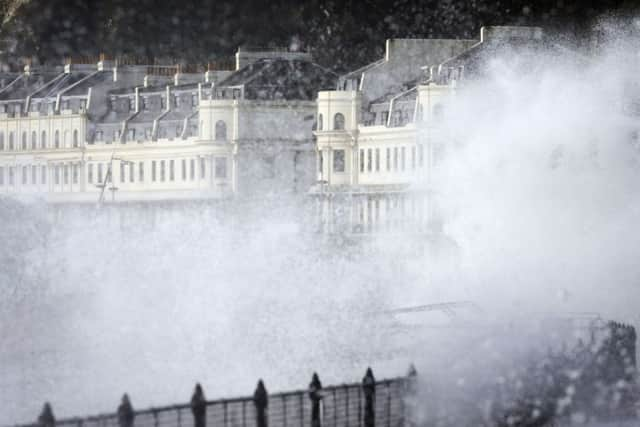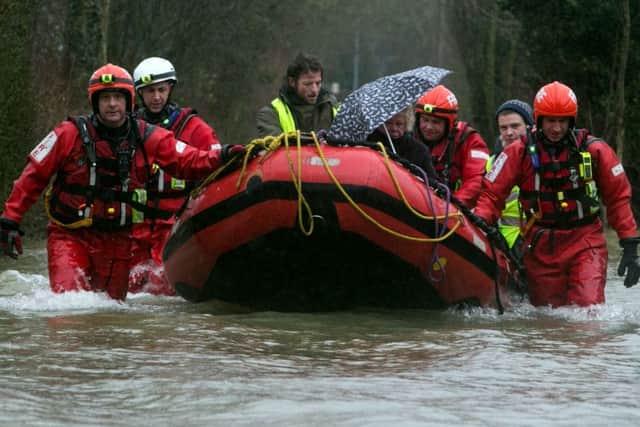100mph storms blowing our way this evening


The Met Office has issued a “red” weather warning for exceptionally strong winds in western parts of Wales and north western parts of England this evening,
Winds of 80mph are expected widely in those areas and gusts could reach up to 100mph in the most exposed locations in west and north west Wales, potentially hitting power supplies, bringing down trees and causing widespread damage.
Advertisement
Hide AdAdvertisement
Hide AdIn addition, large waves could affect some coastal areas, the Met Office warned.


The Met Office has also forecast 70mm (2.75 inches) of rain by Friday in the already sodden West Country - more than the region would normally get in the whole of February - with south Wales, western Scotland, Northern Ireland and other parts of southern England also expected to bear the brunt of the deluge.
The latest bad weather warnings come as a government minister warned there was no “blank cheque” to pay for repairing the damage of weeks of storm and floods that have affected parts of the country.
Prime Minister David Cameron, who this morning chaired a meeting of the Government’s Cobra emergencies committee in 10 Downing Street, promised yesterday that “money is no object” in offering relief to those affected by the floods.
Advertisement
Hide AdAdvertisement
Hide AdBut Transport Secretary Patrick McLoughlin indicated that there would be “careful consideration” before money is spent on the larger rebuilding exercise of restoring damaged infrastructure after water levels recede.


“I don’t think it’s a blank cheque,” Mr McLoughlin told ITV1’s Daybreak. “I think what the Prime Minister was making very clear is that we are going to use every resource of the Government and money is not the issue while we are in this relief job, in the first instance, of trying to bring relief to those communities that are affected.
“Then we have got to do the repairs of the structures and the railway infrastructure that’s been damaged and then the other long-term issues, which will need some careful consideration.”
At the Cobra meeting, Environment Agency chief executive Paul Leinster told the Prime Minister that flooding could reach levels last seen in 1947 in some parts of the UK, though he said improvements in defences since that point meant that fewer homes were expected to be inundated.
Advertisement
Hide AdAdvertisement
Hide Ad“Oxford to Maidenhead we think could rise over the next five days and may lead to more flooding in that area,” Mr Leinster told the committee.
“Below Maidenhead, the levels are holding at the current level but potentially over the weekend and going into the beginning of next week they could rise to higher than the current levels.”
Major General Patrick Sanders, who is coordinating the military response, told the meeting that around 2,000 military personnel are involved in the clean-up operation and support in Somerset was increased overnight.
He told the Prime Minister that “thousands” of extra military personnel were available in a short period of time.
Advertisement
Hide AdAdvertisement
Hide AdMr Cameron said: “I think one of the things we have got to make sure today is that all the local authorities who need help are clear that they can get help.”
Mr Cameron has cancelled a planned trip to the Middle East to take personal charge of the response to the flooding crisis. Tomorrow he will chair the first meeting of a new Cabinet committee set up to oversee the recovery effort.
He warned yesterday that “things may get worse before they get better”, but said every effort would be made to help affected areas get back on their feet, with new support allocated for householders, businesses and farms.
“Money is no object in this relief effort. Whatever money is needed for it will be spent,” said the Prime Minister.
Advertisement
Hide AdAdvertisement
Hide AdSixteen severe flood warnings - indicating a danger to life - remained in place in Berkshire, Surrey and Somerset this morning, with a further 122 flood warnings and 225 flood alerts. There were warnings that high winds could bring down trees and cause disruption to transport and power supplies.
Residents in Staines, Surrey, were evacuated from their flood-hit homes during the night, while around 1,000 homes in the Thameside village of Datchet were left without electricity during the night after power cuts which initially affected 1,700 properties.
A primary school in Wraysbury, Berkshire, was reportedly turned into a “24/7 control centre” for residents affected by flooding, while the BBC reported that the army and police had set up checkpoints in the village following fears of looting at the homes of flood victims.
Thames Valley Police assistant chief constable John Campbell defended the authorities’ response to the flooding in Wraysbury, where furious residents have been filmed berating politicians for leaving them to defend themselves against the rising waters.
Advertisement
Hide AdAdvertisement
Hide AdMr Campbell acknowledged that residents had been “frustrated” by the initial response from authorities, but insisted they were now “happier”, with as many as 100 military personnel deployed to the village to help out.
“Obviously we have to prioritise and focus on trying to defend certain aspects of the Thames and the flood breaches and that was what we were trying to do in the first instance,” he told BBC Radio 4’s Today programme.
“In the first 48 hours or so, a lot of effort with military and blue light services and the Environment Agency was put into preventing further flooding, and that involved a range of activities along the Thames, building flood defences, protecting infrastructure sub-stations and assisting Network Rail with issues in terms of the Maidenhead line.
“One of the unfortunate things about Wraysbury as a location is there are limited flood defences that can take effect around that location - unfortunately it has flooded before.”
Advertisement
Hide AdAdvertisement
Hide AdAbout 100 properties remain flooded on the Somerset Levels, where extra pumps are being brought in from the Netherlands, and groundwater flooding is also expected in the coming days in Hampshire, Kent and parts of London. The Thames barrier closed again yesterday to protect communities to the west of the capital.
EA senior flood adviser Kate Marks warned it was “increasingly likely” that there would also be problems along the River Severn and River Wye.
Since the beginning of December, a total of 5,800 premises have flooded - although the Environment Agency also stressed that 1.3 million have been protected by defences.
Mr McLoughlin warned that the extreme weather of the past few weeks could not be viewed as a “one-off event”.
Advertisement
Hide AdAdvertisement
Hide AdHe told BBC Radio 4’s Today programme: “It was not many years ago that we were all talking about droughts and the problem ‘would our underground water ever fill up again?’. That was three years ago and now we are talking about water just coming up out of the ground into people’s homes.
“So we have got to accept there is more extreme weather and how do we become resilient for it?”
He added: “I don’t think we can just take this as a one-off event.”
But he denied the state was “powerless” in the face of the forces of nature, telling BBC1’s Breakfast: “It isn’t powerless in that it’s got the machinery of government to try to help and alleviate the problems that individuals face.
Advertisement
Hide AdAdvertisement
Hide Ad“And it is also not powerless in making sure that when we do the repairs, we do them at a resilience that will last for future storms that come along.
“Engineering techniques have changed a huge amount and when we rebuild walls we will build them to a different standard of engineering to what they were originally built to.”
Downing Street said Cobra will meet again this afternoon, chaired again by the Prime Minister.
As well as receiving updates from the Environment Agency, Network Rail and Met Office at this morning’s meeting, Mr Cameron spoke by phone with the police “gold commanders” in charge of the response on the ground to flooding in the Thames Valley, Avon and Somerset and Surrey regions.
Advertisement
Hide AdAdvertisement
Hide AdChancellor George Osborne also attended the meeting, and underlined the Prime Minister’s message that money was “no object” in the relief effort, Mr Cameron’s spokesman told reporters in Westminster.
Asked where money would be found to fund extra flood relief spending, Mr Cameron’s spokesman said: “The Government has a number of contingency funds, some of which are in departments.”
More than 50 local authorities have already registered with the Department for Communities and Local Government for help through the Bellwin scheme for emergency financial assistance, which Mr Cameron announced last week will cover 100% of eligible claims during the current crisis rather than the usual 85%.
Asked whether Britain will apply to the European Union for financial assistance available to member states following natural disasters, the spokesman said: “The Government will look at all ways in which local communities can be helped.”
Advertisement
Hide AdAdvertisement
Hide AdUK Independence Party leader Nigel Farage, who has urged the Prime Minister to divert cash from the UK’s £11 billion foreign aid budget to help flood-hit communities, called on Mr Cameron to spell out in detail the extent of financial help that he is now offering.
Mr Farage warned that the cash available from Government contingency funds and departmental underspend would not be enough to deal with damage on the scale seen over the past few weeks and warned that the Prime Minister should not “offer false hope to people in the midst of a crisis”.
“The blunt truth is that it is fantasy for David Cameron to imply that the Government has some magic extra store of money that can be used for this purpose,” said Mr Farage. “The Treasury’s contingency fund is limited and is bound to face other calls on it too.
“If Cameron is only talking about utilising a £60 million transport underspend and one or two other bits and bobs from across Whitehall, then he still clearly does not appreciate the terrible scale of this crisis.
Advertisement
Hide AdAdvertisement
Hide Ad“If, on the other hand, he were to do what I have been calling for and divert the foreign aid budget, even for a single month, then he would have nearly £1 billion to put into both short-term relief and long-term repairs and flood defences. That is the kind of money we need to combat a civil disaster on this scale.
“So the Prime Minister is quite wrong to pretend he has not made a choice between competing priorities. He has. And it is the wrong choice.”
Meanwhile, the Unite union called for a five-year post-flood regeneration plan for the South West and urged the Government to consider resurrecting the regional development agency (RDA) to co-ordinate reconstruction.
Unite regional secretary Laurence Faircloth said: “The South West needs a five-year reconstruction and development plan and we believe that the re-formation of the SWRDA, foolishly abolished in 2012, would be an excellent vehicle to spearhead such a programme.
Advertisement
Hide AdAdvertisement
Hide Ad“Climate experts said that the effects of the flooding could last until May and the Government needs to act quickly to help those in agriculture and business who have lost their jobs. Those struggling, with perhaps no home or income coming in, need assistance now to put food on the table for their families.
“The Government needs to be talking constantly to business and tourism representatives, as well as civic groups, to refine what the South West needs on a daily basis.
“There is also the question of what financial assistance may be forthcoming from the EU - this possible pot of money needs to be investigated as a matter of urgency by ministers.”
At Prime Minister’s Questions Mr Cameron repeated his pledge that “money is no object in this relief effort” as he was questioned by Ed Miliband about the Transport Secretary’s comments.
Advertisement
Hide AdAdvertisement
Hide AdMr Cameron said: “I want communities who are suffering and people who see water lapping at their doors to know that when it comes to the military, when it comes to sandbags, when it comes to restoring broken flood defences, all of those things, money is no object.
“To be fair to the Transport Secretary this is what he said this morning: ‘money is not the issue while we are in this relief job’. That’s what he said, he is absolutely right.”
He urged the emergency services gold commanders co-ordinating the response to flooding not to “think twice” before calling on military assistance.
The Labour leader said some people in flooded communities thought the armed forces were sent in too late, and asked the Prime Minister whether help in the coming days would be provided “in time rather than after the event”.
Advertisement
Hide AdAdvertisement
Hide AdMr Cameron said: “It’s always been possible for gold commanders in these emergency situations to call on military assets. Indeed a military liaison officer is supposed to sit with those gold commanders and liaise with them.
“What we’ve done in recent days is say very clearly to all the local authorities concerned, and we have contacted them individually, ‘if you want military assistance, don’t think twice about it, think once, then ask, and they’ll be there’.”
Downing Street said the total bill for the relief effort would depend in part on how many households and businesses apply for assistance.
More than 5,500 properties have been flooded since early December and could be eligible for grants of up to £5,000 each to fund improvements to make them more resilient in future, said Mr Cameron’s official spokesman.
Advertisement
Hide AdAdvertisement
Hide AdA senior Labour source said: “Having listened to Prime Minister’s Questions, we can safely say that yesterday there were grand promises and today there seem to be a growing list of questions.
“They have been slack in their preparation, they’ve been slow in their response and they seem to be incredibly unco-ordinated in this emergency.
“There was obviously a lack of co-ordination between Eric Pickles and Owen Paterson over the weekend. That has continued into a lack of co-ordination between the Prime Minister and Transport Secretary today.
“What we need is commitments on what the Prime Minister has said. If money is no object, will he commit to reconsidering redundancies at the Environment Agency and greater investment in our flood defences?”